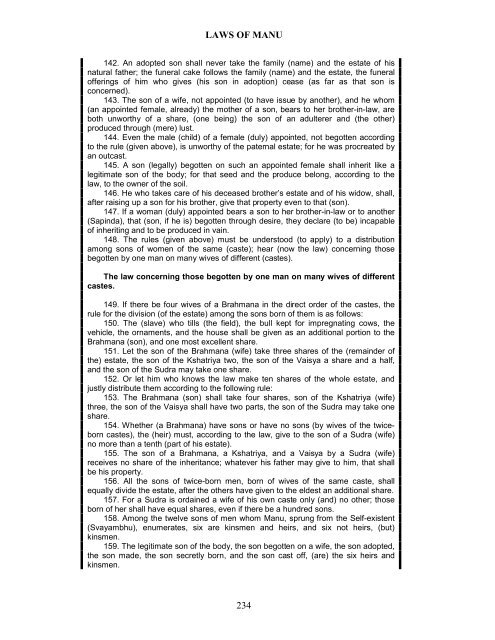Create successful ePaper yourself
Turn your PDF publications into a flip-book with our unique Google optimized e-Paper software.
LAWS OF MANU<br />
142. An adopted son shall never take the family (name) and the estate of his<br />
natural father; the funeral cake follows the family (name) and the estate, the funeral<br />
offerings of him who gives (his son in adoption) cease (as far as that son is<br />
concerned).<br />
143. The son of a wife, not appointed (to have issue by another), and he whom<br />
(an appointed female, already) the mother of a son, bears to her brother-in-law, are<br />
both unworthy of a share, (one being) the son of an adulterer and (the other)<br />
produced through (mere) lust.<br />
144. Even the male (child) of a female (duly) appointed, not begotten according<br />
to the rule (given above), is unworthy of the paternal estate; for he was procreated by<br />
an outcast.<br />
145. A son (legally) begotten on such an appointed female shall inherit like a<br />
legitimate son of the body; for that seed and the produce belong, according to the<br />
law, to the owner of the soil.<br />
146. He who takes care of his deceased brother’s estate and of his widow, shall,<br />
after raising up a son for his brother, give that property even to that (son).<br />
147. If a woman (duly) appointed bears a son to her brother-in-law or to another<br />
(Sapinda), that (son, if he is) begotten through desire, they declare (to be) incapable<br />
of inheriting and to be produced in vain.<br />
148. The rules (given above) must be understood (to apply) to a distribution<br />
among sons of women of the same (caste); hear (now the law) concerning those<br />
begotten by one man on many wives of different (castes).<br />
The law concerning those begotten by one man on many wives of different<br />
castes.<br />
149. If there be four wives of a Brahmana in the direct order of the castes, the<br />
rule for the division (of the estate) among the sons born of them is as follows:<br />
150. The (slave) who tills (the field), the bull kept for impregnating cows, the<br />
vehicle, the ornaments, and the house shall be given as an additional portion to the<br />
Brahmana (son), and one most excellent share.<br />
151. Let the son of the Brahmana (wife) take three shares of the (remainder of<br />
the) estate, the son of the Kshatriya two, the son of the Vaisya a share and a half,<br />
and the son of the Sudra may take one share.<br />
152. Or let him who knows the law make ten shares of the whole estate, and<br />
justly distribute them according to the following rule:<br />
153. The Brahmana (son) shall take four shares, son of the Kshatriya (wife)<br />
three, the son of the Vaisya shall have two parts, the son of the Sudra may take one<br />
share.<br />
154. Whether (a Brahmana) have sons or have no sons (by wives of the twiceborn<br />
castes), the (heir) must, according to the law, give to the son of a Sudra (wife)<br />
no more than a tenth (part of his estate).<br />
155. The son of a Brahmana, a Kshatriya, and a Vaisya by a Sudra (wife)<br />
receives no share of the inheritance; whatever his father may give to him, that shall<br />
be his property.<br />
156. All the sons of twice-born men, born of wives of the same caste, shall<br />
equally divide the estate, after the others have given to the eldest an additional share.<br />
157. For a Sudra is ordained a wife of his own caste only (and) no other; those<br />
born of her shall have equal shares, even if there be a hundred sons.<br />
158. Among the twelve sons of men whom Manu, sprung from the Self-existent<br />
(Svayambhu), enumerates, six are kinsmen and heirs, and six not heirs, (but)<br />
kinsmen.<br />
159. The legitimate son of the body, the son begotten on a wife, the son adopted,<br />
the son made, the son secretly born, and the son cast off, (are) the six heirs and<br />
kinsmen.<br />
234


















